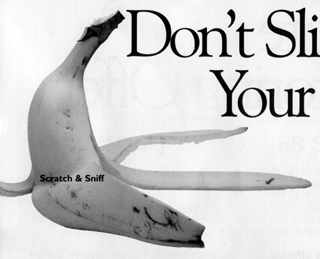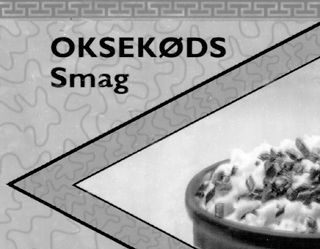| | - 4 April 2000
- Stiff Upper Lip
- I've never been interested in etymology for a couple of reasons. First, there's the embarrassment factor whenever the subject comes up: I always need to refer to a dictionary to reacquaint myself with the difference between "etymology" and "entomology." And even after a visit to my inadequate reference volumes, I'm still unsure about the similarities and differences between etymology, semantics, linguistics, and other such disciplines.
However, these concerns may or may not be relevant to an examination of the origins of the British phrase, "stiff upper lip." According to the story I heard, once upon a time British sailors were buried at sea in canvas coffins. To prepare for burial, a sailor sewed the cadaver of his shipmate into the cloth body bag, with the last stitch going through the dead sailor's upper lip. But why? It turns out that life in his majesty's navy was so wretched that sailors would feign death to escape. Once they were buried at sea in the cotton coffin, the clever sailor could use his knife to cut his way out of the coffin and swim to freedom. Or so the story goes. Of course, such a getaway would be impossible if the sailor were discovered to be alive, hence the need to keep a stiff upper lip. This explanation makes almost no sense whatsoever. Nevertheless, I like it. After all, I never met an apocryphal tale I didn't believe. 

- 5 April 2000
- Scratch & Sniff Art
- I received a strange mailing today that urged, "Don't Slit Your Wrists." I didn't read the propaganda, though, since I've never even thought about slitting my wrists. I did, however, give serious consideration to the admonition on the exterior of the oversized envelope, "Scratch & Sniff." I have no idea what the correlation was between smelling paper impregnated with banana-scented chemical compounds and not slitting my wrists; perhaps I should have opened it.
The junk mail again reminded me that smell is perhaps the most underutilized of media. In fact, I suppose it may be the only unsaturated medium. I read an article that suggested things may soon change, as new technologies provide the chemistry needed to produce any smell on demand. Some company called "DigiScents" is planning on marketing an odor synthesizer called iSmell. I don't think iSmell will make much difference in art. In the future, art will stink literally as well as figuratively. 
- 6 April 2000
- Give and Take
- Ellen noticed I had PixelPasser installed in my computer and asked me how I could justify the cost of such a ridiculously expensive program.
"I don't exactly own it, as such," I waffled. "So where'd you pirate it from?" she asked. "I didn't really pirate it, either," I said. "Well, if you don't own it and you didn't pirate it, how did it end up in your computer?" she inquired. "It's like this," I began. "I happened to find my computer connected to Wisconsin Green College's network, when ..." "You just happened to find yourself connected to a private network?" interrupted Ellen. "Well, whatever," I continued. "So anyway, I noticed the login message on the school's FTP server said, 'Take what you need, leave what you can,' so I did." "OK, so then you took PixelPasser," she said. "Just out of curiosity, did you leave anything?" "Of course!" I confirmed. "I left a copy of my 1993 piece, One Million Randomly Generated Numbers Arranged in Nine Hundred and Sixty Nine Grids. I think the school got the better deal; I traded a wonderful piece of art for an overrated, buggy program." Ellen looked skeptical, but then she always does. 
- 7 April 2000
- Life Ends at Sixty-Four
- I read today that Life magazine is going to stop publishing later this year, as it did in 1972. I became a photographer in 1973, and remember the first shutdown as an injustice. As a student, I was told that being a Life photographer was one of the greatest accolades I could ever hope to earn. Except, of course, I couldn't.
Life resumed publication six years later. By that time, I'd mostly moved on from photography to art, and saw Life as irrelevant to photography, art, and indeed life. Edmund Carpenter provided my favorite critique on Life: "Photographers once thought by getting their photographs published in Life, they would thereby reach large audiences. Gradually they discovered that the only message that came through was Life magazine itself and that their pictures had become but bits of pieces of that message. Unwittingly they contributed to a message far removed from the one they intended." Life is over. Good riddance. 
- 8 April 2000
- Not Quite My Father's Eightieth Birthday
- My father would have been eighty years old today, had he not taken a one-way nap on the 1991 winter solstice.
It's hard to imagine my father at eighty. He wasn't in the best of health when he died; by now I suppose he'd be rather frail. Although I miss him, dying when he was still frisky and optimistic enough to stock his liquor cabinet (the cupboard under the kitchen sink) with the economical one and three-quarter liter plastic bottles of cheap vodka and whisky has something to be said for it. (For the record, I should add that the oversized bottles lasted a long time toward the end of his life, at least when I wasn't there.) It's equally hard to imagine that my father's dead. Some mornings when I'm in the transitory stage between sleep and caffeination, it occasionally occurs to me that I haven't phoned him in a while. It takes me a second or two to remember that I can no longer call him. I wonder if I'll live to eighty? At this point, I really don't care, although I suspect that will change. By 2036, I guess medical technology will have "progressed" to the point where my carcass may be kept technically alive in the unlikely event I will be able to afford such services. We'll see... 

- 9 April 2000
- Oksekøds Smag
- The local Asian grocery store has an amazing array of ramen. Even after ignoring the packets flavored with monosodium glutamate, there is still a wide selection from which to choose. Today, I came home with tasty packets of Oksekøds Smag.
All instant noodles taste the same, especially after I've added green onions and not a few peppers, so buying on the basis of packaging makes a lot of sense. Throughout the brief meal, I kept repeating "oksekøds smag" over and over. It started to sound like a cross between ox and cod, although it tasted like neither. And as for "smag," what is there to say about smag that hasn't been said before? Oksekøds smag, oksekøds smag, oksekøds smag, oksekøds smag, oksekøds smag, oksekøds smag, oksekøds smag, oksekøds smag, oksekøds smag, oksekøds smag, oksekøds smag, oksekøds smag, oksekøds smag, oksekøds smag, oksekøds smag, oksekøds smag, oksekøds smag, and on and on. Bone appetite! 
- 10 April 2000
- Drinking and Publishing
- I learned a few of things about Gutenberg today, starting with his real name: Johannes Gensfleisch zur Laden zum Gutenberg.
What a handle! I also learned that his greatest contribution to publishing wasn't the printing press per se. No, his innovative use of movable, reusable type as well as the appropriate inks were what really changed things. Ironically, Gutenberg may not have printed the Gutenberg Bible, at least not all fifty of them. It turns out that Johann Fust, a fifteenth century vulture capitalist, sued Gutenberg and won. After Gutenberg lost his role in the business, Fust finished the print run of fifty bibles with his son-in-law Peter Schöffer, who had been Gutenberg's assistant. Some things never change. As for the printing press itself, it was just a slightly-modified wine press. Although that may have been the original link between drinking, writing, and publishing, I suspect the Mesopotamians hammering away on cuneiform tablets five thousand years ago were quenching their thirst with something stronger than goat's milk. 
- 11 April 2000
- Voltaire on Lyrics
- One of the disappointments in aging is discovering what bad taste in music I had--and have. It started with Jenna's observation, "Led Zeppelin's not about anything." and that was the beginning of the end. Once the scales were peeled from my ears, I discovered that the lyrics to many of my favorite songs were complete and utter rubbish.
I think François-Marie Arouet de Voltaire accurately summed up contemporary lyrics when he observed, "Anything that is too stupid to be spoken is sung." Things may have been different a century ago, however. For example, take the lyrics to Short and Sweet, a song "written, composed, and sung" by a distant relative of mine, Tom Graham. Brevity's the soul of wit
You often hear folks say,
And I myself do like to tell
Things in the shortest way.
An incident occur'd last week
Which caus'd a lot of fuss,
Perhaps you'll understand me
If I tell it to you thus--C A T of course spells cat,
T O M, he's no flat,
Sometimes after you bet tens,
K I T T E N S. Now if you like to hear a tale
Told in this simple way,
I'll tell you of an accident
I heard the other day.
If I can cut it short and sweet,
'Twill be to your relief;
So here goes for the story,
Now this is it in brief-- G A S, gas did leak,
M A N went to seek,
To find it with a light did try--
M A N--S K Y. The metre of this song is not
What you'd call over quick,
Although the choruses I sing
To you in half a tick.
I've got another tale to tell,
It's one you mustn't miss,
It's rather a long story,
But I'll tell it you like this-- B O Y off his dot,
G O T a cartridge hot
Off it went, and so did he--
I N Q U E S T. Have you noticed when you read
The Evening News at night,
What long accounts they give of
Say, a quarrel or a fight?
Well, I myself was thinking as
I read one down to-day,
Why not cut it short and give it
To us in this way-- W I F E spells wife,
S T R I F E, strife;
Had a frightful row, and the truth to tell,
H O S P I T A L.
- Although I believe the MDCCCXCV copyright expired long ago, I will nevertheless add the copyright notice: "This Song may be sung in public without Fee or License, except at Music Halls."
That's all you'll now hear from me,
G O O D--B Y E. 
last transition | index | next transition
©2000 David Glenn Rinehart
| |

